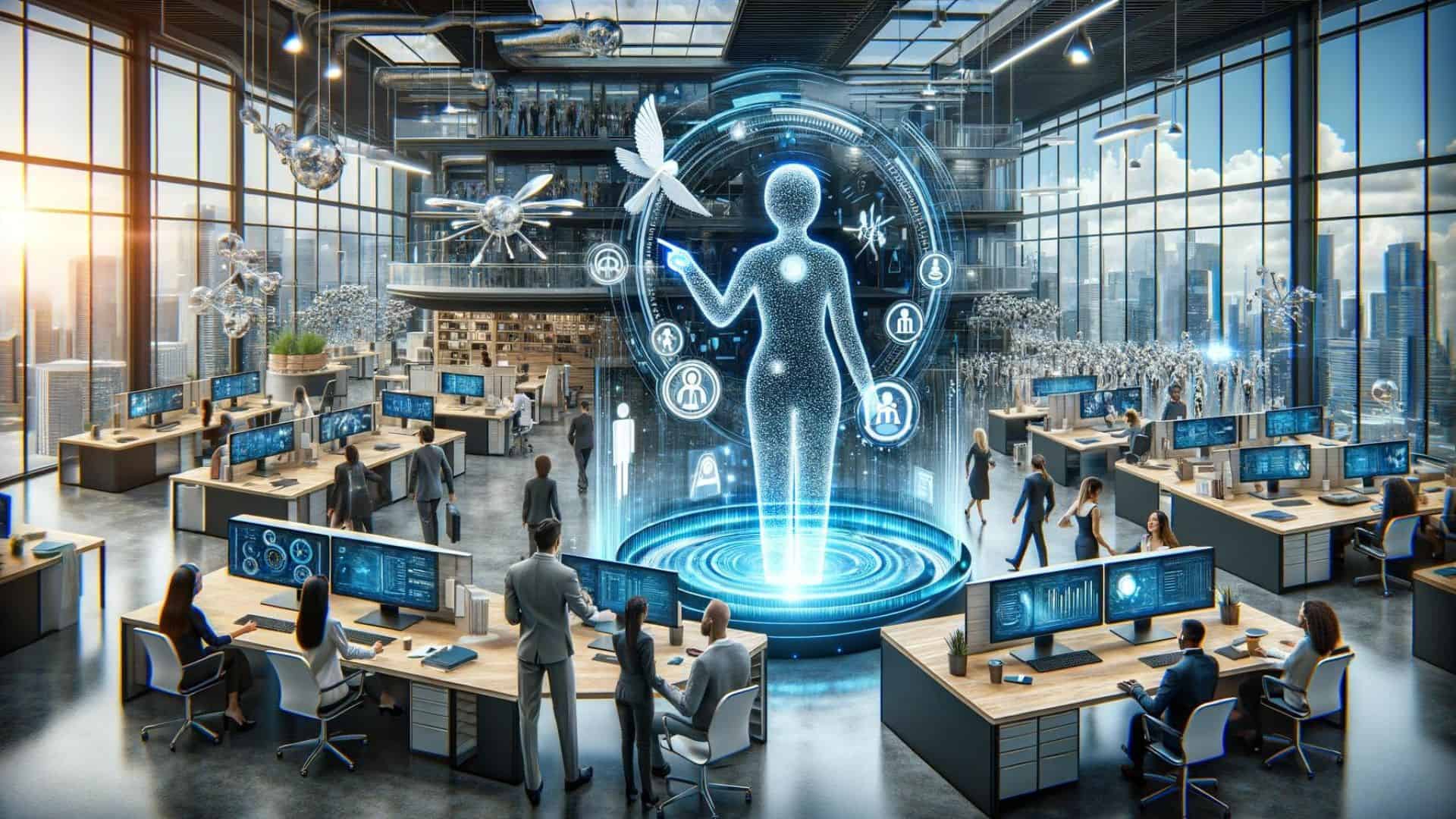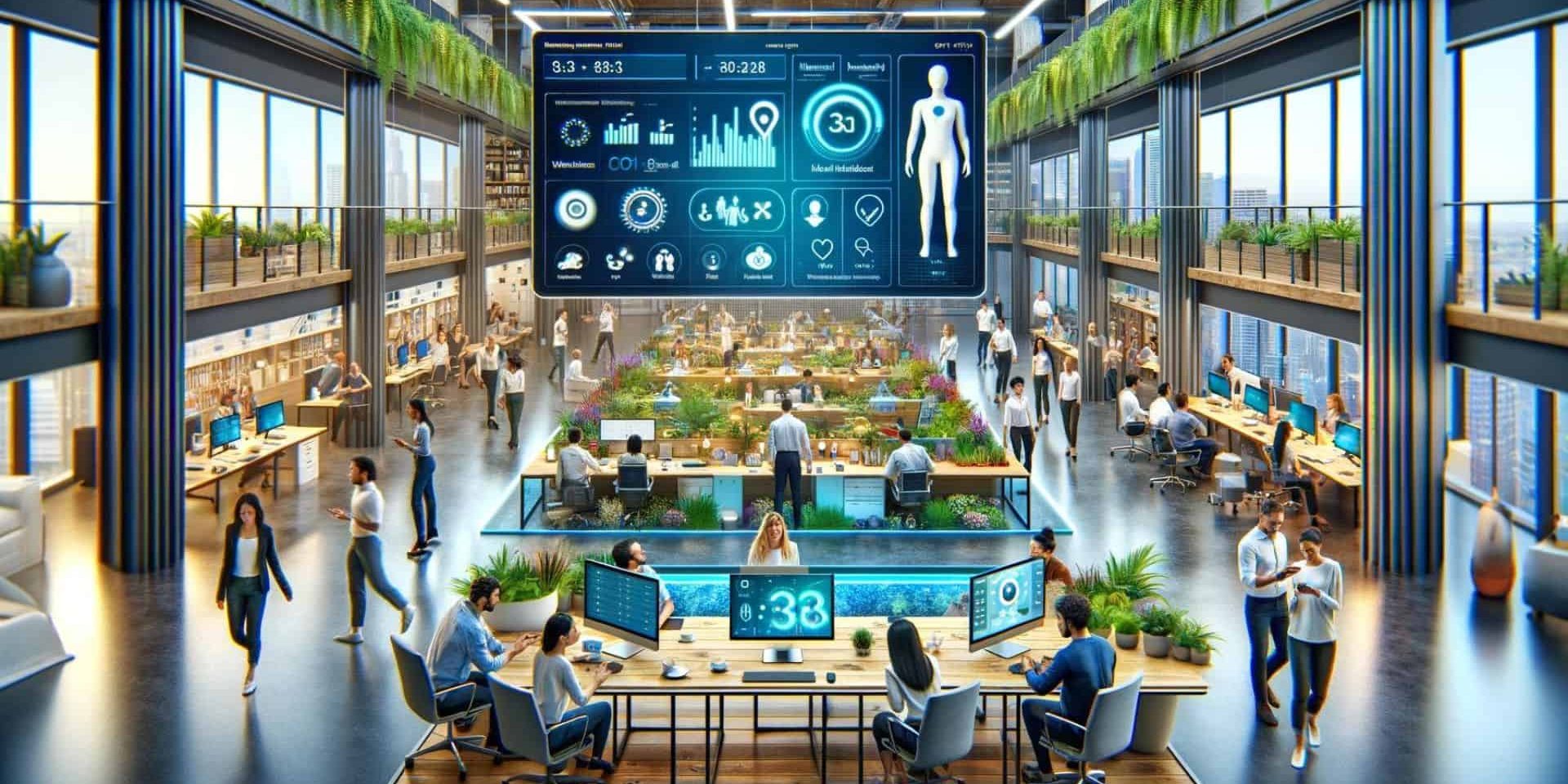Optimizing employee health and well-being is pivotal as the landscape of Human Resource Management undergoes radical transformation through the integration of Artificial Intelligence (AI) into HR Management Software Systems (HRMS). These advanced platforms not only streamline HR operations but also play a crucial role in enhancing employee health. As businesses, particularly small and medium-sized enterprises (SMEs), navigate the complexities of HR management, AI HRMS emerges as a comprehensive solution that is both efficient and adaptable to individual organizational needs. This article delves into the reimagining of wellness programs through AI HRMS and how it is revolutionizing employee onboarding, enhancing performance management, and fostering an environment conducive to continuous learning and development.
Key Takeaways
- AI HRMS is revolutionizing employee onboarding with customizable templates, asset tracking, and seamless wellness program integration, improving the new hire experience.
- Employee wellness is elevated through AI-driven personalized plans and mental health monitoring, incorporating health content into daily routines for holistic well-being.
- AI insights enhance performance management by providing real-time feedback, goal tracking, and data-driven reviews.
- HR operations are optimized with AI HRMS by automating leave and claims processes, streamlining expense management, and maintaining an up-to-date organizational chart.
- AI HRMS fosters a culture of continuous learning and development through on-demand training, AI-enhanced programs, and encouraging ongoing improvement.
Revolutionizing Employee Onboarding with AI

Customizable Profile Templates
In the era of personalized experiences, AI HRMS revolutionizes employee onboarding with customizable profile templates. These templates allow for a tailored approach to each new hire, ensuring that their introduction to the company is as unique as they are.
- Streamlined data entry for personal and professional information
- Flexible template designs to match company branding
- Easy-to-update fields for evolving employee roles
By leveraging AI, companies can automate the creation of profiles that align with specific job requirements and cultural fit. This not only enhances the onboarding experience but also sets the stage for a more engaged and productive workforce.
The right start can set the tone for an employee’s journey. Customizable profile templates ensure that every new hire feels welcomed and valued from day one.
Asset Tracking and Absence Management
The advent of AI in HRMS has streamlined the way businesses manage their assets and employee absences. Asset tracking is now more efficient, with AI systems ensuring that equipment records are kept neat and orderly. This not only reduces the risk of loss or damage but also simplifies the process of assigning resources to new hires.
Absence management has been equally transformed. AI HRMS automates the leave application process, allowing for real-time management of annual leave requests and approvals. This automation ensures compliance with regulations and provides insights into absence patterns, which can inform decision-making and policy adjustments.
With AI account software, businesses can now enjoy a comprehensive view of their financial health, including payroll management and data analysis for informed financial decision-making.
Here’s a glimpse of the functionalities offered by AI HRMS in this domain:
- Employee Leave Application: Facilitates real-time requests and approvals.
- Employee Claim: Speeds up reimbursements while ensuring accurate expense tracking.
- Employee Equipment Record Keeping: Maintains orderly equipment records.
Seamless Integration with Wellness Programs
The advent of AI in HRMS has paved the way for seamless integration with wellness programs, ensuring that employees have access to health resources without disrupting their workflow. With platforms like Beekeeper, integration with existing systems is a breeze, allowing for a smooth transition and continuity in employee wellness initiatives.
By leveraging single sign-on features, employees can effortlessly navigate to wellness resources, reducing login fatigue and promoting greater utilization of health programs.
Instant messaging, group chats, and mobile-friendly forms facilitate real-time communication and engagement, ensuring that wellness becomes a part of the daily conversation. Here’s how AI HRMS enhances the wellness experience:
- Instant access to wellness videos and pamphlets
- Automated reminders for health check-ins and activities
- Personalized wellness content based on employee profiles
The integration of AI HRMS with wellness programs not only supports the physical health of employees but also contributes to a culture of proactive health management within the organization.
Elevating Employee Wellness through Technology

Incorporating Health Content into Daily Routines
The integration of health content into daily routines is a subtle yet powerful way to promote wellness among employees. By leveraging AI HRMS, companies can seamlessly embed health content into the workflow, ensuring that wellness becomes a natural part of the workday. For instance, reminders to take short breaks for stretching or mindfulness exercises can be programmed directly into the system.
- Customized wellness tips can be delivered through notifications.
- Scheduled health challenges encourage participation and team bonding.
- Access to on-demand health resources supports continuous learning.
AI-driven platforms are particularly adept at personalizing these experiences, catering to the unique needs and preferences of each employee. This approach not only fosters a healthier workforce but also contributes to increased productivity and job satisfaction.
Embracing AI HRMS for health content delivery transforms the workplace into a space where well-being is interwoven with daily tasks, creating a culture that values and supports employee health.
AI-Driven Personalized Wellness Plans
In the era of personalized healthcare, AI HRMS systems are at the forefront of offering tailored wellness plans to employees. AI algorithms analyze individual health data and workplace habits to create customized wellness programs that align with each employee’s unique needs. This not only fosters a healthier workforce but also demonstrates a company’s commitment to its employees’ well-being.
Personalization is key in these wellness plans, as they account for factors such as dietary preferences, fitness levels, and stress triggers. By doing so, employees receive a wellness roadmap that is not only effective but also sustainable in the long term.
With AI-driven wellness plans, employees are more engaged and proactive about their health, leading to reduced absenteeism and increased productivity.
Here are some benefits of AI-driven personalized wellness plans:
- Enhanced employee engagement and satisfaction
- Lower healthcare costs due to preventative care
- Data-driven insights into health trends and risk factors
- Increased retention rates as employees feel valued and cared for
Monitoring and Promoting Mental Health
In the realm of employee wellness, AI HRMS plays a pivotal role in monitoring and promoting mental health. By leveraging data analytics and machine learning, these systems can identify patterns that may indicate stress or burnout among employees. This proactive approach allows for timely interventions and support.
Employee engagement tools, such as surveys and polls, are integral to understanding the mental state of the workforce. They provide a platform for employees to voice their concerns anonymously, ensuring that their feedback is heard and acted upon. Here’s how AI HRMS can enhance mental health monitoring:
- Regular mood tracking through quick surveys
- Analysis of engagement levels to spot potential issues
- Personalized wellness resources based on employee feedback
By consistently evaluating engagement and stress levels, organizations can create a more supportive work environment that prioritizes mental well-being.
Furthermore, AI HRMS facilitates a culture of continuous improvement, not just in operational processes but also in nurturing the mental health of employees. It’s about creating a sustainable and healthy workplace where everyone can thrive.
Enhancing Performance Management with AI Insights

Real-Time 360 Feedback Mechanisms
The advent of AI in HRMS has transformed the traditional feedback process into a dynamic and continuous conversation. Real-time 360 feedback mechanisms are pivotal in fostering a culture of immediate recognition and constructive criticism. By leveraging AI, employees receive timely insights into their performance, allowing for swift adjustments and personal development.
- Instant feedback from various sources
- Continuous performance dialogue
- Personalized improvement suggestions
The integration of AI-driven feedback tools ensures that employees are consistently aligned with organizational goals, while also feeling valued and understood.
Incorporating real-time feedback into the HRMS not only enhances employee engagement but also drives a high-performance culture. The table below illustrates the impact of real-time feedback on employee satisfaction and productivity:
| Metric | Before AI Feedback | After AI Feedback |
|---|---|---|
| Employee Satisfaction | 65% | 85% |
| Productivity Increase | 20% | 40% |
By providing a platform for immediate and ongoing feedback, AI HRMS solutions like Beekeeper facilitate a transparent and inclusive environment. This approach aligns with the broader trend of digital transformation in HR, where tools are selected not just for automation, but to create a more connected and agile workforce.
Goal Setting and Progress Tracking
Setting clear, specific objectives is the cornerstone of effective goal setting. For instance, rather than a vague aim like “improve recruitment,” a targeted goal such as “reduce time-to-hire by 30% within the next year” provides a measurable and actionable target. Regularly tracking these goals ensures that efforts remain focused and outcomes are quantifiable.
Embracing AI HRMS allows for the seamless integration of goal setting with real-time progress tracking, fostering a culture of accountability and continuous improvement.
To ensure the success of these initiatives, it’s crucial to get stakeholder buy-in and create a detailed roadmap with implementation plans, milestones, and timelines. Monitoring and continuous improvement are integral, utilizing platforms to gather feedback and optimize processes. Below is a list of key steps to enhance goal setting and progress tracking:
- Define specific, measurable goals
- Regularly review and adjust objectives
- Secure stakeholder commitment
- Develop a comprehensive implementation plan
- Identify and monitor KPIs
- Continuously gather feedback for improvement
Data-Driven Performance Reviews
In the era of digital transformation, performance reviews are no longer just a formality but a strategic tool powered by AI HRMS. Data-driven performance reviews leverage the wealth of information available to provide comprehensive insights into employee performance. This approach not only enhances the accuracy of evaluations but also fosters a culture of transparency and continuous improvement.
- Real-time feedback collection from various sources
- Objective performance metrics
- Personalized development plans
By integrating AI into performance reviews, organizations can ensure that their evaluations are not only fair and objective but also aligned with the company’s strategic goals. The use of analytics helps in identifying patterns and trends that can inform better decision-making for both management and employees.
The table below illustrates a simplified view of how AI HRMS can transform the traditional performance review process:
| Performance Metric | Traditional Approach | AI-Enhanced Approach |
|---|---|---|
| Feedback Frequency | Annual or Bi-annual | Continuous |
| Data Sources | Manager’s Assessment | 360-degree Feedback |
| Goal Alignment | Top-Down | Individualized |
| Development Plans | Generic | Tailored |
Embracing AI HRMS for performance reviews not only streamlines the process but also provides actionable insights that can lead to significant improvements in employee performance and satisfaction.
Optimizing HR Operations with AI HRMS

Automating Leave and Claims Processes
The advent of AI HRMS has brought about a transformative shift in how leave and claims processes are managed. Automation of these tasks not only streamlines operations but also enhances accuracy and employee satisfaction. By leveraging AI, HR departments can now offer a more responsive and efficient service.
- Instantaneous leave application and approval
- Real-time tracking of leave balances
- Swift processing of expense claims
The integration of AI into leave and claims processes ensures a seamless experience for employees, reducing the administrative burden on HR teams and allowing them to focus on more strategic initiatives.
With AI HRMS, the entire leave and claims workflow becomes transparent and accessible, empowering employees with the ability to manage their requests autonomously. This level of self-service functionality is a key component in modern HR management, fostering a sense of empowerment and engagement among the workforce.
Streamlining Expense Management
The advent of AI in HRMS has brought about a significant shift in how businesses handle expense management. AI Account software optimizes financial processes by automating bookkeeping tasks, which not only enhances financial reporting but also ensures a more efficient expense management system. This automation leads to a reduction in manual errors and a faster reimbursement cycle, ultimately benefiting both the employees and the finance department.
AI HRMS solutions have been pivotal in transforming the landscape of expense management. Here are some of the key benefits:
- Automated expense claim submissions
- Real-time expense tracking and approval
- Simplified receipt and document management
- Enhanced policy compliance and fraud detection
By integrating AI-driven tools, companies can now focus on strategic financial planning while leaving the tedious task of expense management to intelligent systems. This integration not only saves time but also contributes to a more transparent and accountable financial environment.
Up-to-Date Organizational Charting
In the dynamic landscape of modern businesses, maintaining an up-to-date organizational chart is crucial for clarity and efficiency. AI HRMS solutions offer automated updates to these charts, reflecting real-time changes in personnel and structure. This feature not only saves time but also ensures that all employees have access to current information regarding reporting lines and team compositions.
Automated organizational chart updates
- Reflects new hires, promotions, and departures
- Visualizes team structures and reporting relationships
- Accessible by all employees for transparency
By leveraging AI HRMS, companies can eliminate the manual effort traditionally associated with updating organizational charts. The system’s ability to adapt to changes instantaneously is a testament to its agility and the value it brings to HR operations.
With AI HRMS, businesses can focus on strategic initiatives rather than administrative tasks, fostering a more responsive and adaptive organizational culture. The integration of AI Account Software further optimizes business operations by automating processes, enhancing accuracy, and ensuring security.
Fostering Continuous Learning and Development

On-Demand Training and Skill Building
In the rapidly evolving business landscape, on-demand training and skill building are essential for maintaining a competitive edge. AI HRMS platforms facilitate this by offering a suite of tools that empower employees to learn new skills as needed.
- Automation of routine tasks
- People Analytics for actionable insights
- Onboarding Software for smooth starts
- AI-Driven Recruiting for optimal hiring
- On-demand training for skill acquisition
Implementing AI account software requires comprehensive training and ongoing support for successful adoption. Case studies show increased productivity and cost savings through automation and error reduction.
The integration of AI into HRMS not only streamlines the learning process but also ensures that the workforce is continuously equipped with the latest industry-relevant skills. This is particularly important as companies face the need to upskill in areas like digitalization and AI to stay relevant. The Royal Dutch Shell case exemplifies the importance of a learning platform that adapts to the industry’s demands, ensuring that employees are prepared for the future.
AI-Enhanced Employee Training Programs
The advent of AI-enhanced employee training programs marks a significant leap in the way organizations approach skill development. Automation in training has transformed the landscape, allowing employees to access on-demand learning resources tailored to their individual needs and schedules. This flexibility ensures that learning and upskilling become integral, yet unobtrusive, parts of the daily workflow.
By integrating AI into training programs, companies are not only streamlining the educational process but also providing a personalized experience that adapts to the learner’s pace and style. This leads to more effective skill acquisition and a workforce that is agile and equipped for future challenges.
The implementation of AI in training also involves a strategic approach:
- Plan and prepare the infrastructure for AI integration.
- Train employees to utilize the new systems effectively.
- Onboard staff with the support of AI tools to ensure a smooth transition.
- Involve key stakeholders and gather feedback to refine the training experience.
With the right strategy, AI-driven training can become a cornerstone of employee development, fostering a culture of continuous improvement and innovation.
Encouraging a Culture of Continuous Improvement
To foster a culture of continuous improvement, organizations must embrace a growth mindset that encourages employees to seek out learning opportunities and adapt to new challenges. Regular reviews and adjustments are crucial in responding to technological changes and shifts in business strategy.
By monitoring the performance of digital HR solutions, such as AI HRMS, and gathering employee feedback, companies can identify areas for enhancement and optimize their processes for better efficiency and effectiveness.
Here are some steps to encourage continuous improvement:
- Embrace digital transformation to redefine roles and improve work efficiency.
- Utilize resources like AI HRMS for comprehensive functions that support HR needs.
- Encourage employees to tap into available resources and adapt successful cases to their roles.
- Continuously monitor and survey users to gather feedback and make necessary optimizations.
With these practices, organizations can ensure that their workforce remains agile and well-equipped to meet the evolving demands of the business landscape.
In today’s fast-paced business environment, fostering continuous learning and development is crucial for staying ahead. AI HRMS is dedicated to empowering your organization with the tools necessary to nurture a culture of growth and innovation. Our Human Resource Management Software is designed to support your team’s development through features like employee training, 360 feedback, and performance reviews. Don’t let your talent management fall behind; visit our website to learn how AI HRMS can transform your HR processes and help you retain top talent. Embrace the future of HR management today!
Conclusion
The integration of AI HRMS into the fabric of HR management has proven to be a game-changer for SMEs, offering a beacon of efficiency and adaptability in the complex realm of employee wellness and overall HR operations. As we have explored, the digital transformation of HR through AI-driven tools not only streamlines processes but also enhances the employee experience, fostering a more engaged and productive workforce. With continuous improvement and monitoring, AI HRMS stands as a testament to innovation, ensuring that businesses remain agile and competitive in the ever-evolving labor market. The reimagined wellness programs and the broader spectrum of HR functionalities provided by AI HRMS are not just a fleeting trend but a strategic move towards a more data-driven, employee-centric future in human resource management.
Frequently Asked Questions
What is AI HRMS, and how does it benefit SMEs?
AI HRMS (Artificial Intelligence Human Resource Management Software) is a cloud-based solution designed to streamline HR processes for small to medium-sized enterprises. It offers a range of functions, such as employee onboarding, wellness program management, leave and claim processing, and performance reviews. By automating routine tasks and providing data-driven insights, AI HRMS enhances efficiency, accuracy, and the overall employee experience.
How does AI HRMS enhance the employee onboarding experience?
AI HRMS enhances the employee onboarding experience by providing customizable profile templates, asset tracking, absence management, and seamless integration with wellness programs. This facilitates a smooth transition for new hires, ensuring they have all the resources they need and are introduced to the company’s health initiatives from day one.
Can AI HRMS help in creating personalized wellness plans for employees?
Yes, AI HRMS can help create personalized wellness plans for employees by incorporating health content into daily routines and utilizing AI-driven analytics to tailor wellness programs to individual needs. This approach ensures that each employee receives a wellness plan that is aligned with their specific health goals and preferences.
What are the capabilities of AI HRMS in performance management?
AI HRMS offers capabilities such as real-time 360 feedback mechanisms, goal setting and progress tracking, and data-driven performance reviews. These features enable continuous performance evaluation and provide employees with immediate, actionable feedback to foster growth and improvement.
How does AI HRMS optimize HR operations?
AI HRMS optimizes HR operations by automating leave and claims processes, streamlining expense management, and maintaining an up-to-date organizational chart. These automated processes reduce manual workload, minimize errors, and ensure that HR operations run smoothly and efficiently.
What role does AI HRMS play in continuous learning and development?
AI HRMS plays a pivotal role in continuous learning and development by offering on-demand training and skill-building resources, as well as AI-enhanced employee training programs. It encourages a culture of continuous improvement, helping employees stay current with industry trends and develop new skills relevant to their roles.








